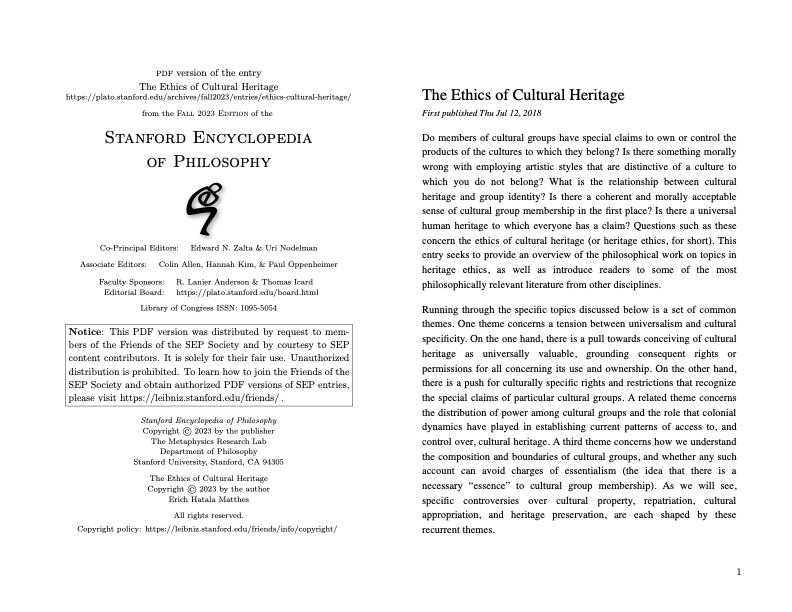The Ethics Of Cultural Heritage Preservation In Civil Engineering Practice
Have you ever wondered about the ethics of cultural heritage? It's a complex and often controversial topic, but one that's incredibly important when it comes to preserving and protecting our shared history and cultural traditions.
In this post, we'll explore some of the key issues surrounding the ethics of cultural heritage, from questions of ownership and repatriation to debates around conservation and restoration. Whether you're an avid history buff or simply someone who cares about the preservation of our cultural heritage, read on to learn more!
What is Cultural Heritage?
Before we dive into the ethics of cultural heritage, let's first define what we mean by the term. Cultural heritage refers to all the things that have been created or inherited by a society, including buildings, artwork, monuments, traditions, and customs.
These things are considered important because they provide a link to our past, and help us to understand who we are as a society and where we have come from. They also play an important role in shaping our identity and sense of community.
Who Owns Cultural Heritage?
One of the biggest questions when it comes to the ethics of cultural heritage is who actually owns these artifacts, buildings, and traditions. Is it the country or society in which they were created, or the individual or institution that currently possesses them?
The answer isn't always clear-cut, and there are a number of factors that can influence ownership. For example, if a valuable artifact is stolen from a country, does the thief now own it? Or does the country still hold claim to it?
This issue is particularly complicated when it comes to colonialism and empire-building. Many artifacts and cultural traditions were taken from colonized nations and brought back to Europe or North America, often without the consent of the local population. This has led to ongoing debates around repatriation and whether these artifacts should be returned to their country of origin.
Preservation vs. Restoration
Another issue that arises when it comes to the ethics of cultural heritage is the tension between preservation and restoration. On the one hand, it's important to preserve these artifacts and buildings so that future generations can learn from them and understand our shared history.
On the other hand, restoring these objects can also be important in order to return them to their former glory and make them accessible to the public. But how far should restoration go? Should we aim to return these objects to their original state, or is some level of alteration acceptable?
Why is Ethical Consideration Important?
So why does all of this matter? Why is it important to consider the ethics of cultural heritage?
First and foremost, it's important because we're dealing with objects and traditions that are often incredibly important to the people and communities they come from. These artifacts and traditions are often intertwined with a group's sense of identity and history, and as such, they should be treated with respect.
It's also important because many of the issues surrounding the ethics of cultural heritage have real-world effects. For example, disputes over ownership and repatriation can lead to diplomatic tensions between countries, while poor conservation practices can lead to the destruction of important historical objects.
Conclusion
Overall, the ethics of cultural heritage is a complex and multifaceted topic. From questions of ownership and repatriation to debates around preservation and restoration, there are a wide range of issues to consider.
However, it's important to remember that at the heart of this topic is a shared desire to preserve and protect our history and cultural traditions.
By engaging in discussions about the ethics of cultural heritage, we can work towards a world where these treasures are respected and celebrated for generations to come.
FAQ
What is an example of cultural heritage?
An example of cultural heritage might be a traditional dance performed by a particular community, or a historic building that provides insight into the architectural styles of a particular era.
What is repatriation of cultural heritage?
Repatriation of cultural heritage refers to the process of returning artifacts or other cultural objects to their country or community of origin. This is often done when these objects were taken or removed without the consent of the local population.
Why is preservation important for cultural heritage?
Preservation is important for cultural heritage because it ensures that these objects and traditions are available for future generations to learn from and appreciate. Without preservation, these treasures could be lost forever.
What is restoration in relation to cultural heritage?
Restoration refers to the process of repairing or renovating cultural objects or buildings in order to make them accessible to the public. This can include anything from cleaning and repairing a painting to restoring a historic building to its former glory.
What are some of the challenges facing the preservation of cultural heritage?
Some of the challenges facing the preservation of cultural heritage include lack of funding, poor conservation practices, and a lack of awareness or appreciation for these objects and traditions.
Why is the ethics of cultural heritage important?
The ethics of cultural heritage is important because it ensures that these objects and traditions are treated with the respect they deserve, and that they are preserved and protected for future generations. By considering the ethical implications of our actions, we can work towards a world where cultural heritage is respected and celebrated for what it is - a rich and meaningful part of our shared history.


Post a Comment for "The Ethics Of Cultural Heritage Preservation In Civil Engineering Practice"